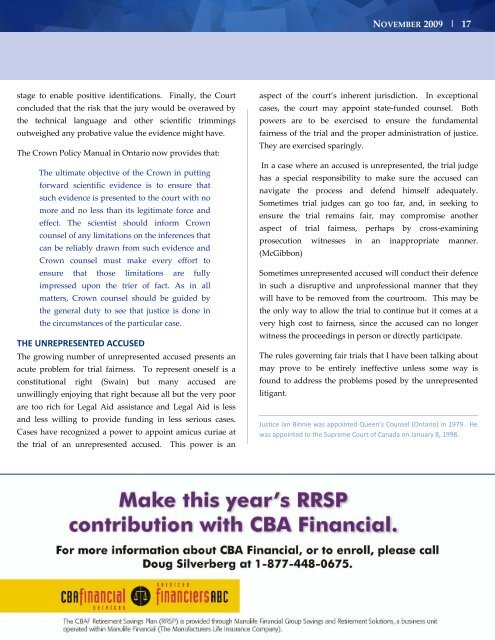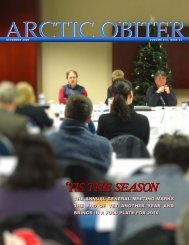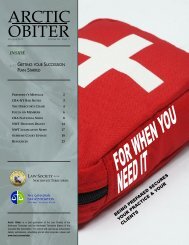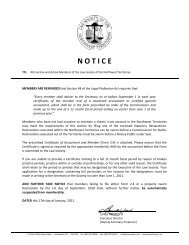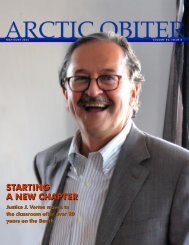ARCTIC OBITER
November 2009 - Law Society of the Northwest Territories
November 2009 - Law Society of the Northwest Territories
You also want an ePaper? Increase the reach of your titles
YUMPU automatically turns print PDFs into web optimized ePapers that Google loves.
NOVEMBER 2009 | 17<br />
stage to enable positive identifications. Finally, the Court<br />
concluded that the risk that the jury would be overawed by<br />
the technical language and other scientific trimmings<br />
outweighed any probative value the evidence might have.<br />
The Crown Policy Manual in Ontario now provides that:<br />
The ultimate objective of the Crown in putting<br />
forward scientific evidence is to ensure that<br />
such evidence is presented to the court with no<br />
more and no less than its legitimate force and<br />
effect. The scientist should inform Crown<br />
counsel of any limitations on the inferences that<br />
can be reliably drawn from such evidence and<br />
Crown counsel must make every effort to<br />
ensure that those limitations are fully<br />
impressed upon the trier of fact. As in all<br />
matters, Crown counsel should be guided by<br />
the general duty to see that justice is done in<br />
the circumstances of the particular case.<br />
THE UNREPRESENTED ACCUSED<br />
The growing number of unrepresented accused presents an<br />
acute problem for trial fairness. To represent oneself is a<br />
constitutional right (Swain) but many accused are<br />
unwillingly enjoying that right because all but the very poor<br />
are too rich for Legal Aid assistance and Legal Aid is less<br />
and less willing to provide funding in less serious cases.<br />
Cases have recognized a power to appoint amicus curiae at<br />
the trial of an unrepresented accused. This power is an<br />
aspect of the court’s inherent jurisdiction.<br />
In exceptional<br />
cases, the court may appoint state-funded counsel.<br />
Both<br />
powers are to be exercised to ensure the fundamental<br />
fairness of the trial and the proper administration of justice.<br />
They are exercised sparingly.<br />
In a case where an accused is unrepresented, the trial judge<br />
has a special responsibility to make sure the accused can<br />
navigate the process and defend himself adequately.<br />
Sometimes trial judges can go too far, and, in seeking to<br />
ensure the trial remains fair, may compromise another<br />
aspect of<br />
trial fairness, perhaps by cross-examining<br />
prosecution witnesses in an inappropriate manner.<br />
(McGibbon)<br />
Sometimes unrepresented accused will conduct their defence<br />
in such a disruptive and unprofessional manner that they<br />
will have to be removed from the courtroom. This may be<br />
the only way to allow the trial to continue but it comes at a<br />
very high cost to fairness, since the accused can no longer<br />
witness the proceedings in person or directly participate.<br />
The rules governing fair trials that I have been talking about<br />
may prove to be entirely ineffective unless some way is<br />
found to address the problems posed by the unrepresented<br />
litigant.<br />
Justice Ian Binnie was appointed Queen’s Counsel (Ontario) in 1979. He<br />
was appointed to the Supreme Court of Canada on January 8, 1998.


